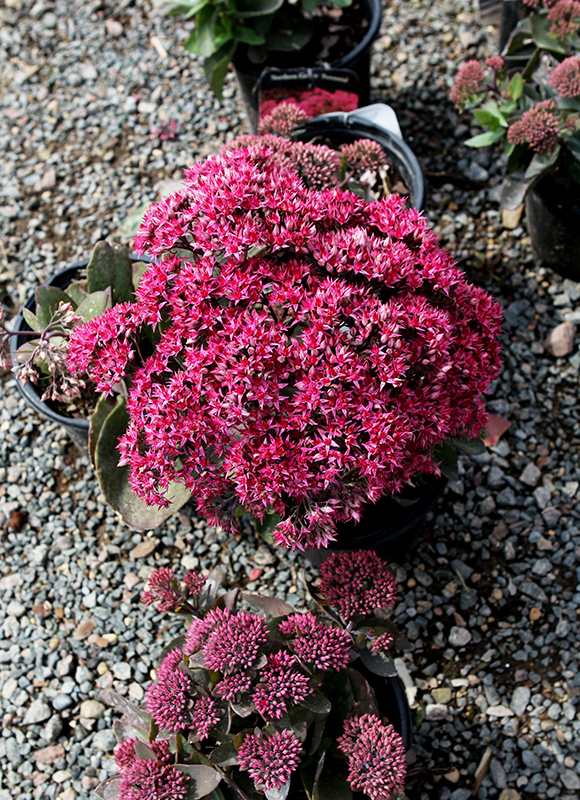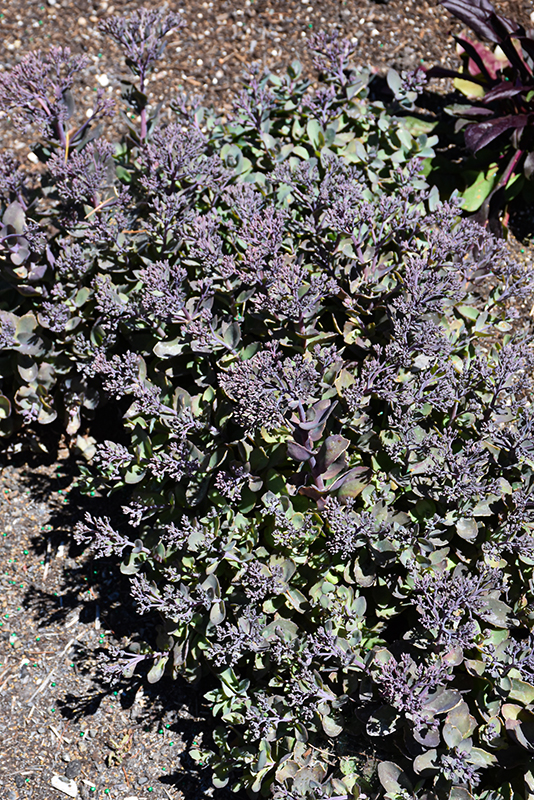Gertens Plant Finder
Height: 7 inches
Spacing: 8 inches
Sunlight:
![]()
![]()
Hardiness Zone: 4a
Other Names: Autumn Stonecrop, Showy Stonecrop
Brand: Terra Nova
Description:
A compact, dense mounded stonecrop that is absolutely covered in deep rose red flowers in late summer, over dark, dusky foliage; a drought-tolerant perennial that does best in poor soils, an excellent choice for late summer color in the garden
Ornamental Features
Dynomite Stonecrop is covered in stunning panicles of rose star-shaped flowers with red overtones held atop the stems from late summer to late fall. The flowers are excellent for cutting. Its attractive succulent round leaves remain grayish green in color with showy steel blue variegation and tinges of deep purple throughout the season.
Landscape Attributes
Dynomite Stonecrop is a dense herbaceous perennial with a mounded form. Its medium texture blends into the garden, but can always be balanced by a couple of finer or coarser plants for an effective composition.
This is a relatively low maintenance plant, and is best cleaned up in early spring before it resumes active growth for the season. It is a good choice for attracting bees and butterflies to your yard, but is not particularly attractive to deer who tend to leave it alone in favor of tastier treats. It has no significant negative characteristics.
Dynomite Stonecrop is recommended for the following landscape applications;
- Mass Planting
- Rock/Alpine Gardens
- Border Edging
- General Garden Use
- Groundcover
- Container Planting
Planting & Growing
Dynomite Stonecrop will grow to be only 6 inches tall at maturity, with a spread of 10 inches. When grown in masses or used as a bedding plant, individual plants should be spaced approximately 8 inches apart. Its foliage tends to remain low and dense right to the ground. It grows at a fast rate, and under ideal conditions can be expected to live for approximately 15 years. As an herbaceous perennial, this plant will usually die back to the crown each winter, and will regrow from the base each spring. Be careful not to disturb the crown in late winter when it may not be readily seen!
This plant does best in full sun to partial shade. It is very adaptable to both dry and moist growing conditions, but will not tolerate any standing water. It is considered to be drought-tolerant, and thus makes an ideal choice for a low-water garden or xeriscape application. It is not particular as to soil pH, but grows best in poor soils, and is able to handle environmental salt. It is highly tolerant of urban pollution and will even thrive in inner city environments. This particular variety is an interspecific hybrid. It can be propagated by division; however, as a cultivated variety, be aware that it may be subject to certain restrictions or prohibitions on propagation.
Dynomite Stonecrop is a fine choice for the garden, but it is also a good selection for planting in outdoor pots and containers. It is often used as a 'filler' in the 'spiller-thriller-filler' container combination, providing a mass of flowers and foliage against which the thriller plants stand out. Note that when growing plants in outdoor containers and baskets, they may require more frequent waterings than they would in the yard or garden. Be aware that in our climate, most plants cannot be expected to survive the winter if left in containers outdoors, and this plant is no exception. Contact our experts for more information on how to protect it over the winter months.
Buy Now on Gertens.com:



